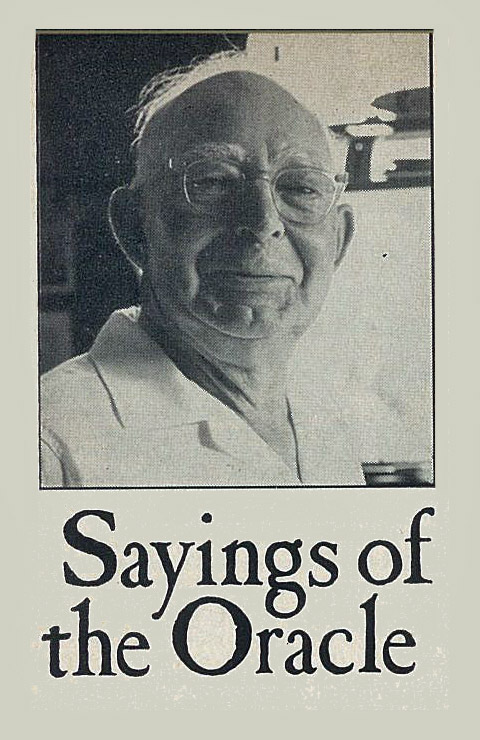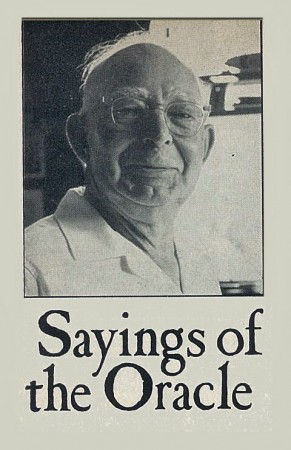Sayings of the Oracle
Excerpt from “Sayings of the Oracle,” Yankee Magazine January 1964. ♦Me.: Dear Oracle: A question you may be able to answer. My husband has a century-old clock with wooden works–used by his grandfather on a clipper ship. Do you know of anyone who can make it run? A.S.Get Our FREE Yankee Best New England Vacations […]

Coffee By Design | Portland, Maine
Photo Credit : Katherine Keenan
Excerpt from “Sayings of the Oracle,” Yankee Magazine January 1964.
♦Me.: Dear Oracle: A question you may be able to answer. My husband has a century-old clock with wooden works–used by his grandfather on a clipper ship. Do you know of anyone who can make it run? A.S.
♦Answer: Philip Horton, Vineyard Haven, Mass., repairs clocks with wooden works and even replaces damaged wooden gear-wheels in them.
♦D.C.: Dear Oracle: About the word sillcock. To us in Massachusetts years ago it was the outside faucet to which the garden hose was attached. Here in Washington, D. C., I have found no one from any state familiar with the word, neither is it to be found in my 1951 Webster’s. Will you please elucidate? F.H.W.♦Answer: Webster’s New International Dictionary defines “sill cock” as a water faucet placed on the outside of a house at about the height of the sill. This is our understanding of the word and we are plumb surprised to find it unknown anywhere, except maybe in Washington, D.C., where plenty of things haven’t been heard of yet, as it seems. But we figure that there is more to it than this. Here’s why: within a year or two, we have run afoul of people whose name was “Sillcock” or “Silcock.” There has to be an explanation for this which we cannot supply. But it seems to us that a family name, whatever it may be, must be older by a long shot than the water faucet. We will try to run it down.
♦L.I., N.Y.: Dear Oracle: As to the abbreviations for ships–S/S and M/S, I take it these are steam ship and motor ship–right? But what, pray tell, is this one: V/S or W/V? A.G.♦Answer: S.S.–Steamship; M/V.–Motor Vessel; G.S.–Gas-Screw; N.S.–Nuclear; M/S.Motor Ship. About V/S–we went to one of our largest oil companies whose manager happens to be a master-mariner, and he said blowed if he ever heard of such a thing! He looked in books and the books didn’t have it either. We have to wonder if somebody made a mistake.
♦Ohio: Dear Oracle: Re “bruising” liquor in the August Yankee. I’m surprised at you. I thought you knew everything. My husband was a fastidious drinker and I learned from him. A martini must not be shaken. Ingredients are put in a tall glass and gently stirred with a long-handled spoon so as not “to bruise the vermouth.” E.D.Y.♦Answer: Something wrong somewhere. We quoted Webster, who, according to all tradition, knew as much about liquor as most folks. If the old coot has led us astray, we will take down his bust which stands on our office shelf and give it to a Baptist rummage sale!
♦Pa.: Dear Oracle: About the origin of O.K., I thought I’d tell you that I read an explanation in the Classical Journal which claimed the expression came from the Greek, phonetically, ola kala, meaning “everything fine.” The contributor said that schoolmasters in ancient Greece used to mark their students’ work with the letters “O.K.” E.S.McC.♦Answer: This is most interesting and we appreciate your interest. Just the same, we are as dubious as the devil about this explanation. We have a feeling that the ancient Greeks didn’t use the word “fine” in describing conditions or conveying words of good cheer.
♦L.I., N.Y.: Dear Oracle: Why don’t you tell us what your name is? Why do dogs eat grass? G.A.W.
♦Answer: You must have missed a copy of Yankee a spell ago. It not only carried our name but a good deal of information about us, some of it calculated to startle the multitudes. Now, about dogs eating grass–most any animal, given the opportunity, will eat something plumb out of the ordinary, if he feels a spell of sickness coming on. Dogs eat grass, so do cats, to sort of tone up or scour out their digestive systems. Cows will chew rawhide or leather, and pigs will eat meat, especially pork, under some circumstances. They like fish, too.








Miss him and that Yankee feature. Glad to read this page, Thank You.
Fond memories of sitting down with Yankee and reading his monthly colomn…